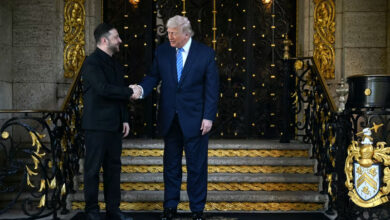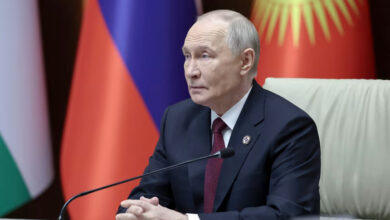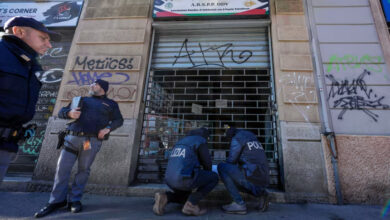
BRUSSELS (Reuters) – In a meeting last week in the Europa building in Brussels, home of the European Union’s political leadership, diplomats for the 27 member states were desperate.
The EU had paid billions of euros toward shots to curb a pandemic that was killing thousands of Europeans every day. Now vaccine-makers had cut back deliveries, and the EU was trapped in a public fight.
“This is a catastrophe,” French ambassador Philippe Leglise-Costa told the January 27 meeting, according to a diplomatic note seen by Reuters.
It was a crucial moment in nearly two weeks of confusion and anger over the EU’s vaccine supply, which were to plunge the bloc into its deepest crisis since Ursula von der Leyen took over the executive European Commission just over a year ago.
A week earlier, the EU had set a target to vaccinate 70 percent of adults against COVID-19 by the end of summer, a potential ticket out of lockdowns that have cost countries billions. As the impact of the vaccine shortfall became clear, the bloc embarked on a campaign to shame drugmakers hit by production delays into releasing more supply.
But the tactic wasn’t working and details of confidential deals were leaking out, casting doubt on the EU’s ability to enforce contracts it had agreed on behalf of its members.
Reuters has obtained exclusive details of internal EU talks over the past month in diplomatic notes, and interviewed four people present at key meetings to verify them. The notes reveal how the EU’s top executives lurched from satisfaction about the vaccination program to panic.
Some EU officials were already aware in December of delays in vaccine production, the notes show, but the Commission announced ambitious targets nonetheless. The EU initially kept no track of companies’ vaccine doses leaving the bloc, only realizing after its own supplies were delayed it could not trace the millions of doses that had already been exported. And as its attempts to win ground by legal means failed, the Commission faced sharp attacks from EU governments on its public communication strategy.
In a pandemic that has killed over 700,000 people in Europe alone, the delays announced by the companies producing coronavirus vaccines – AstraZeneca PLC and Pfizer Inc. – risked leaving millions in Europe unprotected deep in the winter, just as new, more transmissible, variants were circulating and hospitals were being overwhelmed. Vaccination centers from Madrid to Paris had closed for lack of supply.
The EU Commission declined comment for this story. So did AstraZeneca, which has said it is focused on boosting supplies to the bloc after the manufacturing glitches. The Commission has often said it expects an exponential increase in the availability of vaccines from April. Pfizer’s Chief Executive Albert Bourla told Reuters production is back on track in Europe after the company made changes at its Belgian manufacturing site to increase supply.
The vaccine squeeze was not just a public health nightmare. It was also a political crisis.
Britain, freshly divorced from the EU’s single market after five years of bitter negotiations, was inoculating people at a much faster pace than any EU country, public data show.
Diplomats feared the Commission was losing the battle against a “narrative of … big failure,” a senior EU diplomat who was present at the Jan. 27 meeting told Reuters. They urged the Commission to cool a row with British company AstraZeneca for the sake of getting drugs as soon as possible, the notes show and people present said.
The Commission’s dilemma underscores the power of big drugmakers as governments scramble to vaccinate their citizens, and the geopolitical tensions that can result.
Eventually, the notes show EU diplomats recognised the bloc may not benefit from arguing about contracts with AstraZeneca. Instead, the Commission turned up the heat on the United Kingdom – which AstraZeneca said was preventing British-made vaccines from reaching Europe – only to swiftly step back after realising it risked disrupting a border agreement in the Brexit accord which London and Dublin said could have serious consequences for security in Northern Ireland.
The damage to the EU’s image was visible on the front pages of Britain’s eurosceptic popular press, with headlines declaring “EU vaccines war explodes” and “EU chiefs behaving like the mafia.”
A spokesman for the French ambassador said he had urged the EU “to communicate in an orderly and strategic manner.”
A British government spokesperson said, “We are in constant contact with the vaccine manufacturers and remain confident that the supply of vaccine to the UK will not be disrupted.” The UK government declined to comment on AstraZeneca’s claim it was preventing vaccines from reaching Europe, but said it does not prohibit any export of COVID-19 vaccines.
“GLITCH-FREE”
The month started calmly for member states, who had agreed at the start of the pandemic to form a steering group with the EU executive to negotiate with drugmakers, to support smaller states and prevent internal squabbling.
EU Commission officials and diplomats involved met in the Europa Building’s S7 Room, a windowless chamber where delegates assembled at a round table beneath a ceiling decorated with dozens of squares in pastel colours. The Commission was represented by the EU’s top vaccine negotiator, Sandra Gallina, an Italian national who started working for the EU Commission more than three decades ago as an interpreter. She declined to comment for this story.
The EU was about three weeks behind Britain in launching a vaccine – largely because it opted against issuing emergency regulatory approval as Britain had done. But the EU had announced deals with six vaccine-makers to secure nearly 2.3 billion doses for its population of 450 million.
Pfizer, working with German partner BioNTech, was one of only two firms whose shots had approval. It was the only one supplying the EU, which had announced deals for up to 600 million Pfizer doses. The roll-out began immediately after Christmas.
“Deliveries are so far mostly glitch-free,” Gallina told diplomats in a January 8 briefing, according to a note from the meeting.
Gallina told the briefing the EU was receiving 3.5 million doses of the Pfizer vaccine a week. She underscored that the UK, by contrast, had reserved only four million doses of the Pfizer shot until February. Pfizer declined to comment, saying delivery schedules are confidential.
Gallina told diplomats some countries were passing on their share of Pfizer doses in anticipation of securing drugs from AstraZeneca, which was due to launch deliveries to the EU once its vaccine won regulatory approval there in late January. Both companies’ vaccines are made and exported from plants a short drive from Brussels. AstraZeneca also makes vaccines for the EU at factories in Germany and Britain, according to the EU Commission.
Gallina told the meeting member states saw AstraZeneca as a “star” for its low prices and big numbers.
The companies have declined to comment on prices; AstraZeneca’s vaccine costs about 2.5 euros ($3) per dose, against 15.5 euros for Pfizer’s, two EU negotiators directly involved in talks with vaccine makers told Reuters. AstraZeneca committed to deliver at least 80 million doses through March, or up to 120 million, an official involved in the talks told Reuters.
EU negotiators were aware AstraZeneca was scaling back its planned supply because of production problems. The company had told the EU’s steering group on December 4 that it would reduce its targets for the first quarter to two-thirds of the 120 million maximum, according to a diplomatic note.
At a public hearing on January 12 in the European Parliament, Gallina told EU lawmakers that she had heard only three instances of “relatively minor” complaints about deliveries.
REALITY CHECK
Three days later, on January 15, Pfizer too said it had trimmed production and would temporarily cut supplies to the EU from its Belgian plant. There was an immediate public outcry across Europe. Italy’s special commissioner for COVID-19, Domenico Arcuri, said Italy was considering legal action against Pfizer.
Despite these delays, the EU Commission went ahead and announced an ambitious vaccination goal.
On Jan. 19, when just over five million vaccines had been administered in the EU, the Commission published targets to inoculate at least 80 percent of health workers and the elderly above the age of 80 by March, and 70 percent of the EU’s adult population by the end of the summer. It also proposed a way to donate excess doses to poorer countries.
The next day in the S7 Room briefing, EU diplomats told Commission officials those goals were too bold.
“We have only about two percent vaccinated. How did you come up with the 70 percent target?” a representative from Lithuania asked. “We prefer to under-promise and over-deliver,” the Dutch delegate said. A spokesman for the Dutch ambassador confirmed the Netherlands had raised concerns about the ambition in the Commission proposal. A spokeswoman for the Lithuanian ambassador declined to comment.
Three days later, the notes showed Gallina telling diplomats that Pfizer’s sudden cut had “savaged” member states’ vaccination plans. But she reassured them shipments would resume the following week.
“SHOCKED”
Worse was to come. On Friday January 22, AstraZeneca, due to start EU deliveries on February 15, said it would cut supplies further over the first three months. A senior official involved in the talks told Reuters this would mean a roughly 60 percent fall – to 31 million doses instead of 80 million.
The European Commission went on the offensive. A few hours after the announcement, Health Commissioner Stella Kyriakides tweeted about her “deep dissatisfaction.” The following Monday the Commission summoned AstraZeneca’s executives to meetings to pressure the company to lift deliveries.
The Commission won concessions – AstraZeneca sweetened its offer to add eight million doses from an earlier date of February 7.
It was not enough. Aware of production problems at AstraZeneca’s Belgian site, the EU Commission asked for drugs from Germany and Britain. But AstraZeneca offered no clarity on whether doses could be diverted from Britain, an EU official who attended the meeting said.
The next day, the company’s Chief Executive Pascal Soriot told European newspapers AstraZeneca was not legally required to deliver doses to the EU on a precise timeline, because its contract only stated it would make its “best efforts” to deliver.
He also said Britain had signed up for its vaccine earlier than the EU and had asked to be served first from UK-based plants. The UK government declined to comment.
Soriot’s remarks infuriated the EU Commission. On January 27, according to the notes, Gallina told diplomats she was “shocked” by “the level of incorrect statements” that she said Soriot had made about AstraZeneca’s commitments. AstraZeneca declined to comment.
The Commission, saying it was confident of the strength of its legal arguments, publicly demanded AstraZeneca publish the contract they had agreed. A heavily redacted version was eventually made public on January 29.
“BACK AGAINST THE WALL”
At the January 27 meeting, Gallina told delegates around the S7 Room table that some of the problems with AstraZeneca had already been known, but the new cut was “a big blow.”
She also said the EU had no breakdown of who was exporting vaccines where. “We have some information but we need more,” she said.
Rough customs data showed millions of COVID-19 vaccines had been exported in past weeks from the EU to Britain, Canada, Israel and China, she said. The EU Commission did not respond to a request for export data. Britain, Israel and Canada have said they received Pfizer’s vaccines from the EU; Britain has also said it received AstraZeneca’s vaccine from the EU. Fosun, the China-based company which has exclusive rights to sell Pfizer’s vaccine in China and Hong Kong, had no comment.
Gallina added the EU would set up a new mechanism to track and licence exports. The EU’s lawyers could use several legal arguments to pressure AstraZeneca into releasing more doses, she added.
The briefing did not go well. At least five diplomats told the meeting the Commission had pushed too far in its public fight and urged it to calm the dispute, at least privately. Legal action would not produce more vaccines quickly, they said.
“The Commission has its back against the wall,” French ambassador Leglise-Costa told the meeting, according to the notes. He urged an immediate change in the communication strategy.
Later that day, on another call with the Commission, Soriot told the EU not to expect doses from AstraZeneca’s factories in Britain because London was using a clause in its contract that gave it priority over doses made in the United Kingdom, two EU officials told Reuters.
“ACT OF HOSTILITY”
Seeing that diplomats wanted to tone down the fight with AstraZeneca, the Commission set its sights on Britain’s government.
The next day, EU officials publicly threatened to block vaccine exports – a move likely to hit Britain’s imports of vaccines from Pfizer’s Belgian plant. And the Commission said it wanted to set up a mechanism that would require companies to seek authorisation before exporting vaccine doses.
On Friday January 30, it took a further step, threatening to trigger a clause that would block vaccines from reaching Northern Ireland – a British-run province that remained part of the EU internal market after the Brexit divorce.
Imposing restrictions on that border was potentially explosive: The Brexit talks had agreed to keep it open, to preserve the central plank of a 1998 peace deal ending 30 years of armed conflict in the province.
Northern Ireland’s First Minister Arlene Foster called the EU proposal “an incredible act of hostility,” and EU officials soon admitted it was excessive.
By Sunday, the Commission had retreated on both fronts.
Commission President Von der Leyen announced in a tweet the bloc had achieved a “step forward on vaccines.” AstraZeneca had offered to increase deliveries, she said.
After a week of fighting and diplomatic confusion, the EU had secured just one million doses more than the firm’s initial sweetened offer, her tweet revealed.
By Francesco Guarascio, John Chalmers




